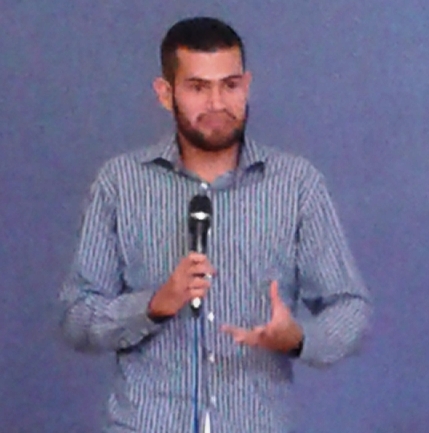
Jun 3, 2018 | Focolare Worldwide
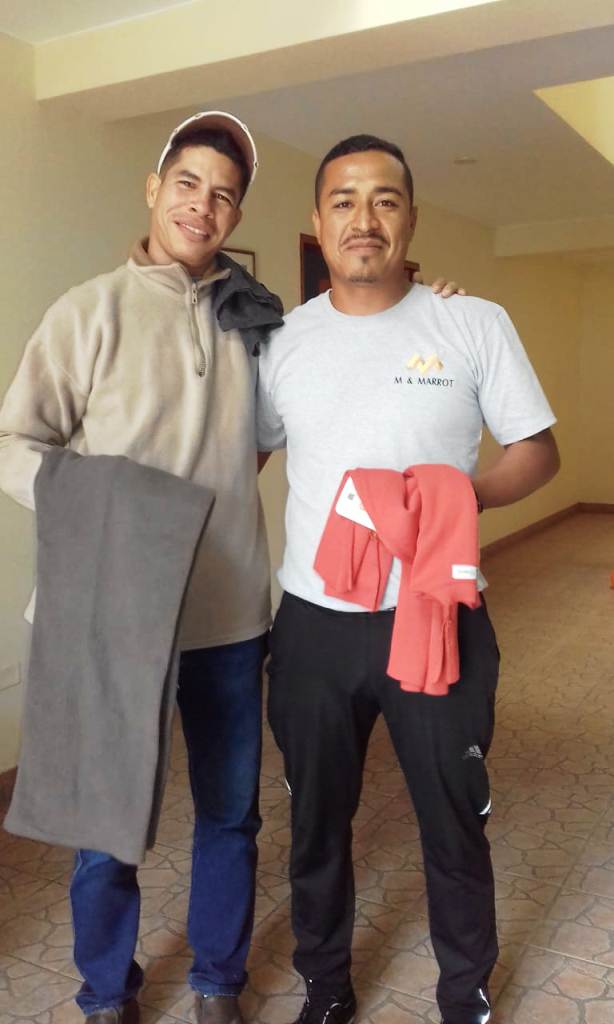 “The influx of immigrants at the border is growing by the hour. The economic crisis that is bringing the country to its knees brings pain both to those who stay and those who decide to flee.” The words of Silvano Roggero, a Venezuelan and son of Italian immigrants, show the drama that an entire people is living through. For the last three years he’s been living in the Focolare center in Lima, Peru. “Despite enormous difficulties caused by the sudden and unexpected entry of hundreds of thousands of people, the neighboring countries, with the usual generosity of these lands, are attempting to take them in. I have personally witnessed one of the many dramas that today’s ‘humanity at the periphery’ is living through. “Just yesterday the director of a school in the peninsula of Paraguaná, in the north of Venezuela, wrote to me. Something different is happening in the office there: a number of parents have come to withdraw their children. They have been forced to leave.” It’s an exodus of biblical proportions, caused by an extremely serious economic and social crisis, one that is overturning the makeup of an entire country. Inflation has skyrocketed, and food, medicine and raw materials are running out. “In December 2017, Ofelia and Armando from the Focolare community in Valencia (the third-largest city of Venezuela), moved to Lima. At first they managed an early childhood center.
“The influx of immigrants at the border is growing by the hour. The economic crisis that is bringing the country to its knees brings pain both to those who stay and those who decide to flee.” The words of Silvano Roggero, a Venezuelan and son of Italian immigrants, show the drama that an entire people is living through. For the last three years he’s been living in the Focolare center in Lima, Peru. “Despite enormous difficulties caused by the sudden and unexpected entry of hundreds of thousands of people, the neighboring countries, with the usual generosity of these lands, are attempting to take them in. I have personally witnessed one of the many dramas that today’s ‘humanity at the periphery’ is living through. “Just yesterday the director of a school in the peninsula of Paraguaná, in the north of Venezuela, wrote to me. Something different is happening in the office there: a number of parents have come to withdraw their children. They have been forced to leave.” It’s an exodus of biblical proportions, caused by an extremely serious economic and social crisis, one that is overturning the makeup of an entire country. Inflation has skyrocketed, and food, medicine and raw materials are running out. “In December 2017, Ofelia and Armando from the Focolare community in Valencia (the third-largest city of Venezuela), moved to Lima. At first they managed an early childhood center.  “Then Ofelia had a dream: find somewhere to offer a preliminary welcome to the swarms of people arriving after travelling seven days over land. We’re talking about close to 300,000 Venezuelans arriving in Peru over the last year and a half! “Ofelia and others,” continues Silvano, “organized a welcome dinner in the Focolare for a small group of Venezuelans. Some already had heard of the movement, but there were some who did not know anything about our group. Our guests came from different parts of the city, some as far as an hour or two away. They find it difficult to get around in this metropolis of almost 10 million inhabitants.” It seemed like a drop in the ocean, but what motivated them was to welcome these people as if they were Jesus in person who turned up at the door. “As you can imagine, faced with their difficult situations, we did not have preconceived solutions. We had no idea where to begin even, although what we could do was offer them a hot meal and listen. Chiara Favotti
“Then Ofelia had a dream: find somewhere to offer a preliminary welcome to the swarms of people arriving after travelling seven days over land. We’re talking about close to 300,000 Venezuelans arriving in Peru over the last year and a half! “Ofelia and others,” continues Silvano, “organized a welcome dinner in the Focolare for a small group of Venezuelans. Some already had heard of the movement, but there were some who did not know anything about our group. Our guests came from different parts of the city, some as far as an hour or two away. They find it difficult to get around in this metropolis of almost 10 million inhabitants.” It seemed like a drop in the ocean, but what motivated them was to welcome these people as if they were Jesus in person who turned up at the door. “As you can imagine, faced with their difficult situations, we did not have preconceived solutions. We had no idea where to begin even, although what we could do was offer them a hot meal and listen. Chiara Favotti
Jun 1, 2018 | Non categorizzato
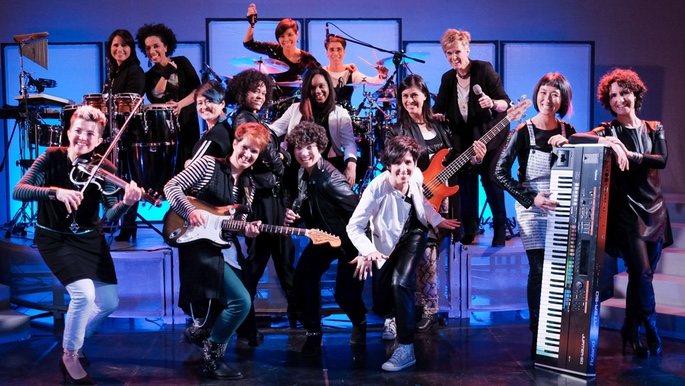
Jun 1, 2018 | Non categorizzato
 DATES
DATES
From July 1st to 5th: Workshop with young people
From July 6th to 8th: GenFest
GenVerde Tours
May 31, 2018 | Focolare Worldwide
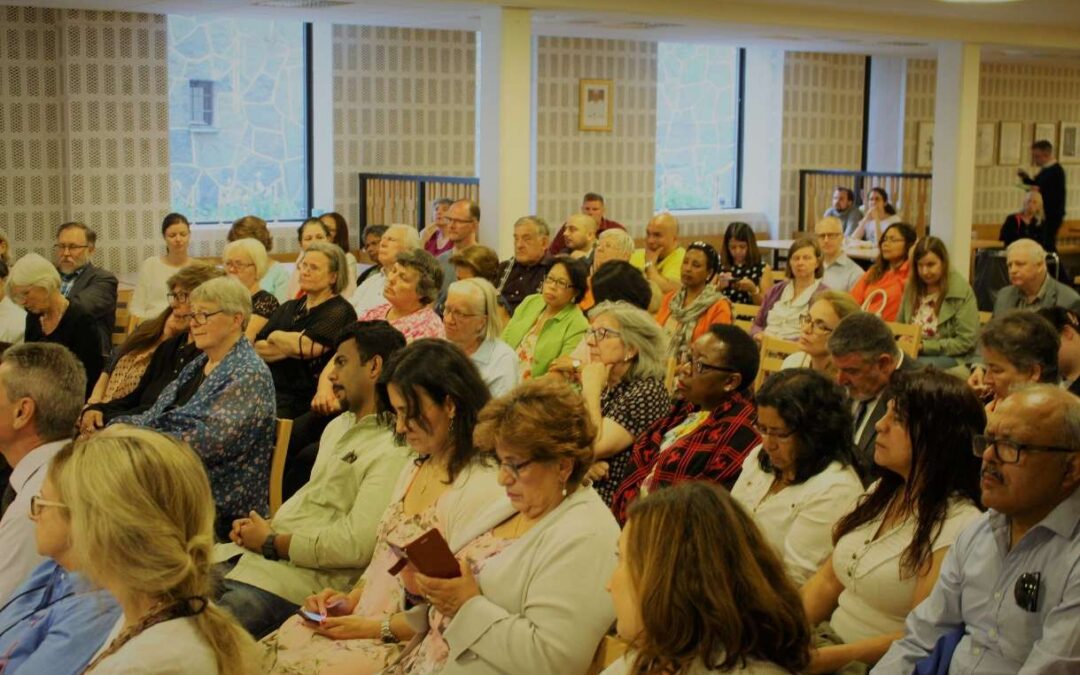
May 31, 2018 | Non categorizzato
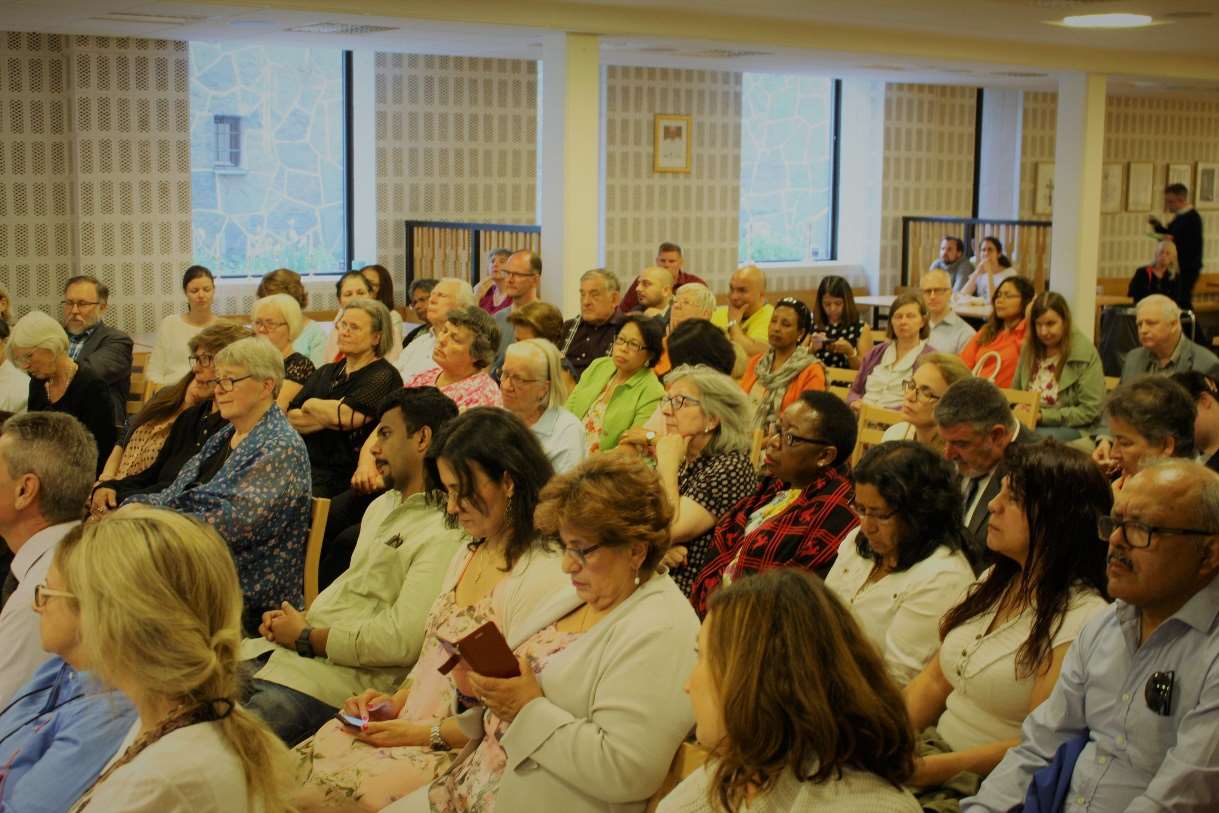 On the eve of the feast of Pentecost, 19th May, the Diocese of Stockholm hosted a meeting of movements within the Catholic Church, including the Focolare Movement, the Charismatic Renewal and the Neocatechumenal Way. Over one hundred people attended. Pope Francis’ Apostolic Exhortation “Gaudete et exsultate” was presented, provoking an enriching exchange among those present. During the celebratory Mass, Cardinal Anders Arborelius of Stockholm expressed how precious he considers the presence of ecclesial movements in the local Church. The Focolare community responded: “We all felt co-responsible for the meeting, and by the end of the day we were all so joyful and grateful. We think this was a sign of the tangible presence of Jesus guiding his ‘little flock’. Every year, this meeting is becoming more and more enthusiastically received, and we feel the communion among us all is truly growing”.
On the eve of the feast of Pentecost, 19th May, the Diocese of Stockholm hosted a meeting of movements within the Catholic Church, including the Focolare Movement, the Charismatic Renewal and the Neocatechumenal Way. Over one hundred people attended. Pope Francis’ Apostolic Exhortation “Gaudete et exsultate” was presented, provoking an enriching exchange among those present. During the celebratory Mass, Cardinal Anders Arborelius of Stockholm expressed how precious he considers the presence of ecclesial movements in the local Church. The Focolare community responded: “We all felt co-responsible for the meeting, and by the end of the day we were all so joyful and grateful. We think this was a sign of the tangible presence of Jesus guiding his ‘little flock’. Every year, this meeting is becoming more and more enthusiastically received, and we feel the communion among us all is truly growing”.
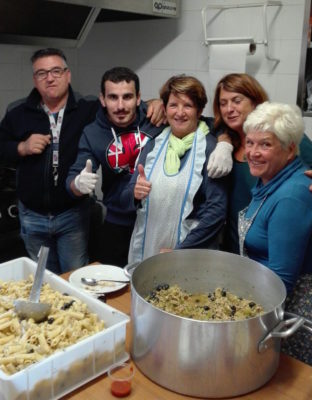
May 30, 2018 | Focolare Worldwide
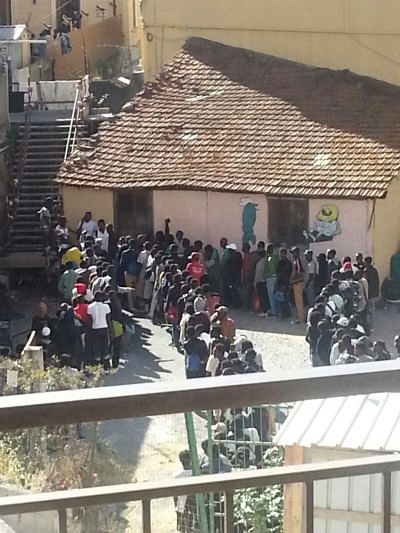 Ventimiglia is a “gate,” not a “border” – at least as long as France does not suspend the agreements in place that allow people to come and go. So it has become a funnel for migrants who consider Italy a stepping stone to reach destinations beyond the border. “In the past year, more than 20,000 people have come through Ventimiglia,” says Paola, a member of the local Focolare community. “It’s like adding another Ventimiglia, since our population is around 24,000 inhabitants.” A teacher at the diocesan seminary, she recalls how “between February and March 2015, the seminarians started to distribute food to the homeless at the station. As days went by, however, the homeless started to multiply.” They were seeing migrants who, after landing on the Italian coast, aimed to cross the border with France and reach other European countries. “That’s when the ‘emergency’ began, and it has not let up since. At the beginning we joined other locals to volunteer and distribute sandwiches on the street.” Collaborating with Caritas, “we contacted the Focolare community on the other side of the border, and they took turns with us, supporting us with money collected from fundraising during Monaco’s Grand Prix. “In June 2015,” she continues, “a Red Cross camp sprung up near the station. Access was limited, but a number of us could enter under HACCP and collaborate in a number of ways.” Alongside this “official” camp was another more “informal” one, right on the border with France. “Many immigrants had no documents, and seeing that the camp organized by the Red Cross required identification, many preferred staying there and trying to cross the border as fast as they could.” Then, at the beginning of October, the camp was dismantled and cleared out in a “pretty rough way.” “When the Red Cross camp was closed in May 2016, we suddenly found ourselves with more than a thousand people in town. It was an unsustainable situation, worsened by a local law that prohibits distributing food and essential goods to immigrants, which carries penalties and tickets. “Then Caritas intervened to mediate. That’s how we started welcoming people at the Church of Sant’Antonio. By day it was a church; by night, a dormitory. Families with children and the most vulnerable were hosted in the church – the pews were moved and we brought covers, and then in the morning we would clean it all up.”
Ventimiglia is a “gate,” not a “border” – at least as long as France does not suspend the agreements in place that allow people to come and go. So it has become a funnel for migrants who consider Italy a stepping stone to reach destinations beyond the border. “In the past year, more than 20,000 people have come through Ventimiglia,” says Paola, a member of the local Focolare community. “It’s like adding another Ventimiglia, since our population is around 24,000 inhabitants.” A teacher at the diocesan seminary, she recalls how “between February and March 2015, the seminarians started to distribute food to the homeless at the station. As days went by, however, the homeless started to multiply.” They were seeing migrants who, after landing on the Italian coast, aimed to cross the border with France and reach other European countries. “That’s when the ‘emergency’ began, and it has not let up since. At the beginning we joined other locals to volunteer and distribute sandwiches on the street.” Collaborating with Caritas, “we contacted the Focolare community on the other side of the border, and they took turns with us, supporting us with money collected from fundraising during Monaco’s Grand Prix. “In June 2015,” she continues, “a Red Cross camp sprung up near the station. Access was limited, but a number of us could enter under HACCP and collaborate in a number of ways.” Alongside this “official” camp was another more “informal” one, right on the border with France. “Many immigrants had no documents, and seeing that the camp organized by the Red Cross required identification, many preferred staying there and trying to cross the border as fast as they could.” Then, at the beginning of October, the camp was dismantled and cleared out in a “pretty rough way.” “When the Red Cross camp was closed in May 2016, we suddenly found ourselves with more than a thousand people in town. It was an unsustainable situation, worsened by a local law that prohibits distributing food and essential goods to immigrants, which carries penalties and tickets. “Then Caritas intervened to mediate. That’s how we started welcoming people at the Church of Sant’Antonio. By day it was a church; by night, a dormitory. Families with children and the most vulnerable were hosted in the church – the pews were moved and we brought covers, and then in the morning we would clean it all up.”  In July 2016 a new Red Cross camp was opened outside the city for men. Women and children continued to be hosted in church. “In 2017 a seemingly infinite influx of minors began, and most of them stayed along the Roya River. The local prefect asked the Red Cross to open up a section of the camp for them. “In the meantime, there were continual sweeps, with hundreds of immigrants boarded on to buses for Taranto in Southern Italy. Yet just days later they were back again. “The fact is,” she explains, “that these people want to reconnect with relatives in other countries, and this is why they are ready to do anything. It’s from here that they can try to cross the border. There are some who have tried ten times before succeeding.” The border is guarded day and night. “Unfortunately, all we are doing is fostering dependency. But they don’t need clothes or a pair of shoes. They need to exercise their freedom of self-determination, which every person should have.” Perhaps the solution could be to create a transit camp, Paola suggests, “a place where an immigrant, during the journey, can stop, find nourishment, wash, change clothes – where they can receive medical attention and legal assistance they need.” Paola calls their service “nothing at all,” but it is these details that help these travelers feel like people again. “We cook African or Arab recipes based on couscous and rice, which we learned how to mix with spices and create dishes according to their traditions. “One day we noticed that a Syrian woman bathed herself each time she came to Caritas, yet she kept putting on the same outfit. She was wearing a tunic with pants. She kept reaching into the piles of clothes, but each time she went away empty handed. “Then we understood and asked some friends from Morocco if they had some clothes in her style. Finally, she was able to change and went away happy.” Source: United World Project
In July 2016 a new Red Cross camp was opened outside the city for men. Women and children continued to be hosted in church. “In 2017 a seemingly infinite influx of minors began, and most of them stayed along the Roya River. The local prefect asked the Red Cross to open up a section of the camp for them. “In the meantime, there were continual sweeps, with hundreds of immigrants boarded on to buses for Taranto in Southern Italy. Yet just days later they were back again. “The fact is,” she explains, “that these people want to reconnect with relatives in other countries, and this is why they are ready to do anything. It’s from here that they can try to cross the border. There are some who have tried ten times before succeeding.” The border is guarded day and night. “Unfortunately, all we are doing is fostering dependency. But they don’t need clothes or a pair of shoes. They need to exercise their freedom of self-determination, which every person should have.” Perhaps the solution could be to create a transit camp, Paola suggests, “a place where an immigrant, during the journey, can stop, find nourishment, wash, change clothes – where they can receive medical attention and legal assistance they need.” Paola calls their service “nothing at all,” but it is these details that help these travelers feel like people again. “We cook African or Arab recipes based on couscous and rice, which we learned how to mix with spices and create dishes according to their traditions. “One day we noticed that a Syrian woman bathed herself each time she came to Caritas, yet she kept putting on the same outfit. She was wearing a tunic with pants. She kept reaching into the piles of clothes, but each time she went away empty handed. “Then we understood and asked some friends from Morocco if they had some clothes in her style. Finally, she was able to change and went away happy.” Source: United World Project
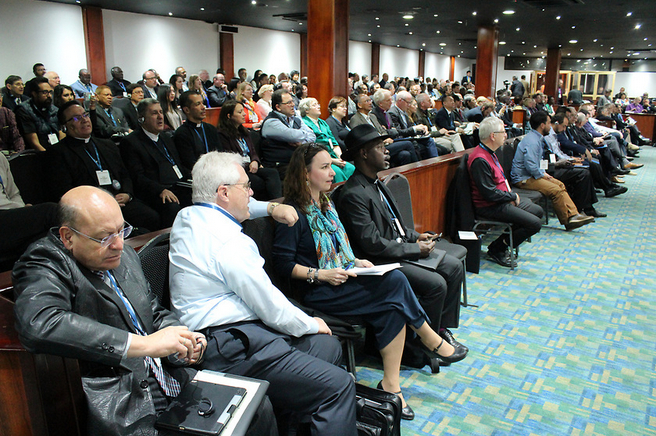
May 29, 2018 | Non categorizzato
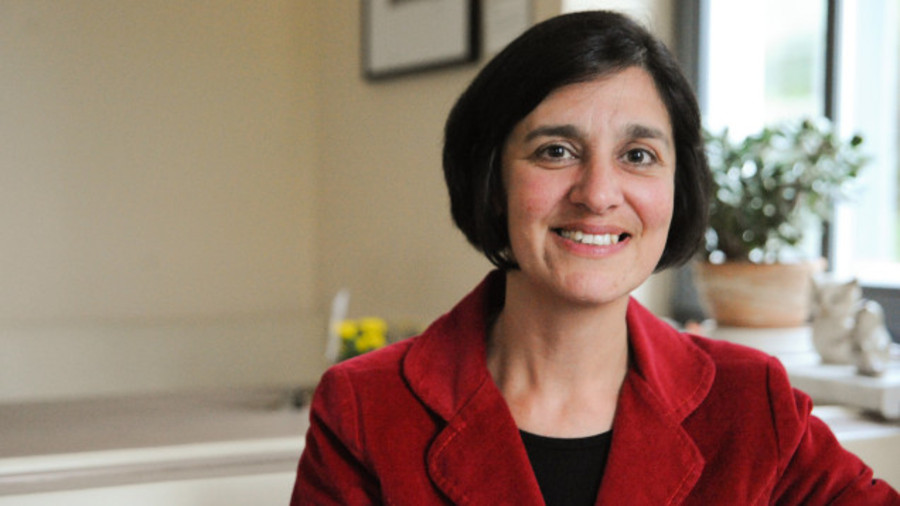
Beatriz Sarkis
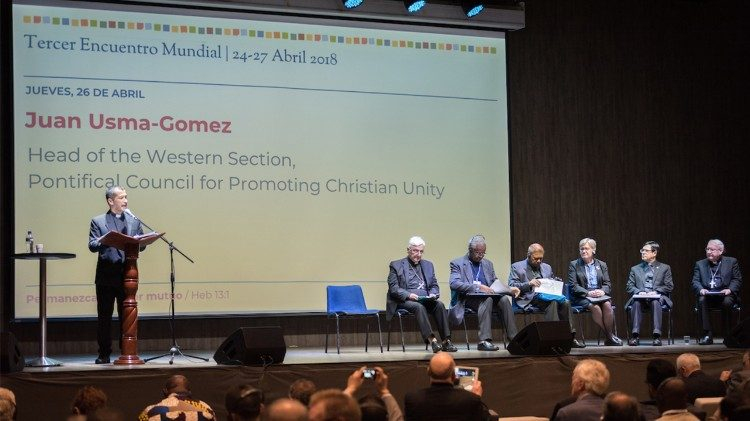
Photo credit © Albin Hillert/WCC

Photo credit © Albin Hillert/WCC
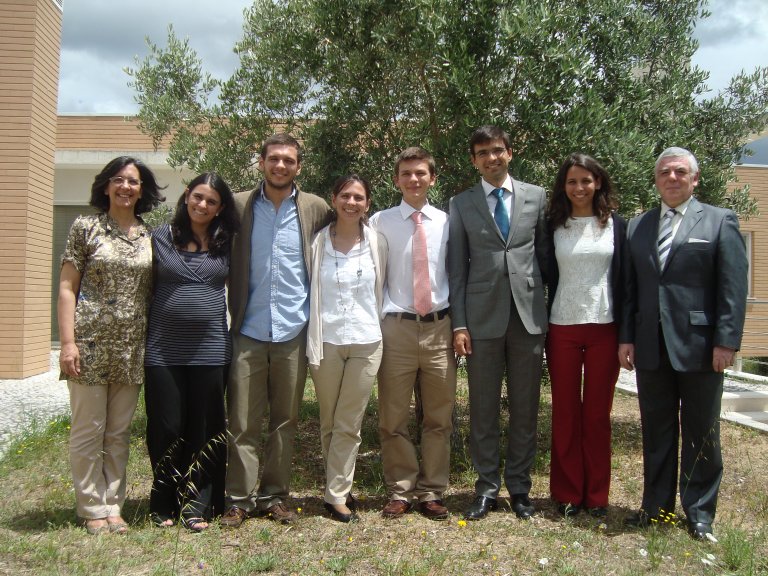
May 28, 2018 | Non categorizzato
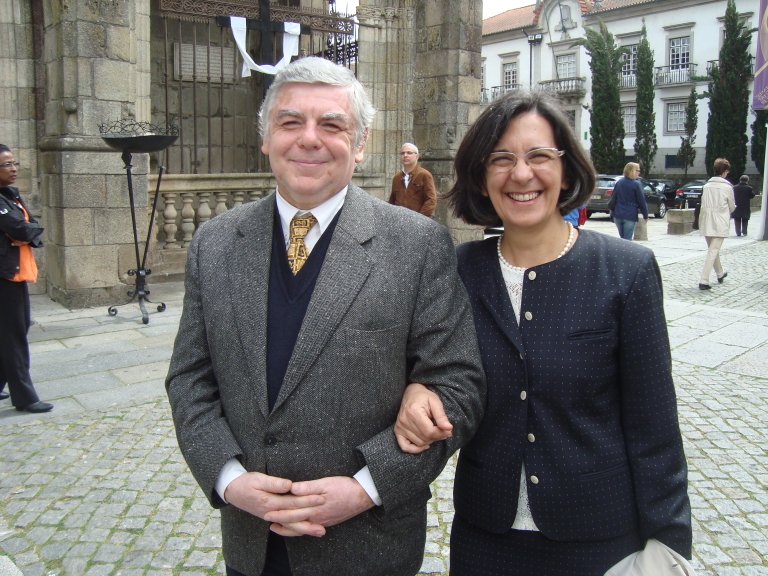 “You, Chiara, are the one who helped us understand what marriage truly is: openness and the fulfilment of the plan of God on us. We will use all our strength for the family and the world to become what they should be”. Maria da Conceição, known to all as São, wrote this to Chiara Lubich at the start of our joint adventure – recalls Zé Maia. We got married in Braga in 1981 and from our union six children were born. Then the grandchildren started arriving, nine so far. Chiara Lubich had proposed to São a particular phrase of the Gospel to guide her life: “He must increase and I must decrease. (John 3:30)’. How many times São repeated this to me over the years!” In 2002 Zé and São, both Portughese, moved with their children to the nascent Focolare town “Arco Iris”, 50 km from Lisbon, to help in its foundation. In November 2016, São went to the Mariapolis Centre of Castelgandolfo near Rome, to participate in the “Together for Europe” event. “Before she left for Rome, she said to me, Zé recounts, ‘I’m happy to be part of this meeting; I believe this is the way we should follow”. It was to be her last act of love, joyfully living her life for others. Completely unexpectedly, on 11th November, she had a heart attack and God called her to himself.”
“You, Chiara, are the one who helped us understand what marriage truly is: openness and the fulfilment of the plan of God on us. We will use all our strength for the family and the world to become what they should be”. Maria da Conceição, known to all as São, wrote this to Chiara Lubich at the start of our joint adventure – recalls Zé Maia. We got married in Braga in 1981 and from our union six children were born. Then the grandchildren started arriving, nine so far. Chiara Lubich had proposed to São a particular phrase of the Gospel to guide her life: “He must increase and I must decrease. (John 3:30)’. How many times São repeated this to me over the years!” In 2002 Zé and São, both Portughese, moved with their children to the nascent Focolare town “Arco Iris”, 50 km from Lisbon, to help in its foundation. In November 2016, São went to the Mariapolis Centre of Castelgandolfo near Rome, to participate in the “Together for Europe” event. “Before she left for Rome, she said to me, Zé recounts, ‘I’m happy to be part of this meeting; I believe this is the way we should follow”. It was to be her last act of love, joyfully living her life for others. Completely unexpectedly, on 11th November, she had a heart attack and God called her to himself.”  Today, what I am going through is living her, whom I find within me, as “one flesh” but now between heaven and earth. Her last words remain fresh in my mind, when she challenged us to “go ahead together, courageously”. So I start again every day, with the encouragement and help of the Focolare life. At home with my family, we’re discovering a “new us”, and experiencing how all we’ve built with love remains. It continues because eternity is perfect love. I’m constantly seeking how to become both father and mother. I’m living as if São was here with me, welcoming other people to our home, or out doing the shopping. Together with her I go to get flowers, or cook a nice lunch for the children or prepare those special treats the grandchildren love. Together with her I’ll speak to someone to correct them if need be, or support them or encourage them. It’s a constant dialogue between earth and heaven. Since São’s death, I’ve made a new discovery of Jesus in the Eucharist, as the moment in which we meet. Certainly, I feel so sad at times, but I find those moments are helping me to open up my heart towards my neighbours. I do feel the dark shadow of loneliness. But I realise I need to turn away from this and follow the light. At the end of each day I can find gratitude in my heart in the moments I lift up my gaze towards the invisible. Yet fear can still creep up on me like a thief, poised to steal away my peace of mind. And at times it’s as though my soul yearns to fly away to somewhere else. But in those moments I allow that ray of light to speak to me, it greets and welcomes me». “Sometimes I write to my children to tell them what I’m living with their mother. ‘Each day, through the kaleidoscope of the soul, I see her with a new kind of beauty, like a blue sky in which I can contemplate the mystery of he’. Life goes on in the family and in communion with others around me. I most assuredly miss her, I miss her company, I miss her companionship and I miss sharing everything with her. No-one can ever be ready to lose their spouse, to be left alone without the beloved voice and loving glances. The loss is felt at all levels, emotional, psychological and relational, as well as practically with the children, with the family as a whole and at work.” In 1967 Chiara Lubich addressed this issue. “The sacrament of marriage makes of two persons one, spiritually as well as physically”, she said. So when one of a couple “departs” for heaven “the marriage is ‘broken’, in the Will of God. It is a divine something – if you can say this – like a small Trinity that breaks”. So it is a real purification which can be best approached by setting oneself to love the people around. This year I seem to have discovered the meaning of God as Love. Love, more than being “of” God, is God himself. Only love remains. We found a short prayer São had written: “Help us to become the family you want us to be. Give me the grace to overcome all difficulties with wit, wisdom, intelligence and goodness. Help us to see everything in your own light”». Gustavo Clariá
Today, what I am going through is living her, whom I find within me, as “one flesh” but now between heaven and earth. Her last words remain fresh in my mind, when she challenged us to “go ahead together, courageously”. So I start again every day, with the encouragement and help of the Focolare life. At home with my family, we’re discovering a “new us”, and experiencing how all we’ve built with love remains. It continues because eternity is perfect love. I’m constantly seeking how to become both father and mother. I’m living as if São was here with me, welcoming other people to our home, or out doing the shopping. Together with her I go to get flowers, or cook a nice lunch for the children or prepare those special treats the grandchildren love. Together with her I’ll speak to someone to correct them if need be, or support them or encourage them. It’s a constant dialogue between earth and heaven. Since São’s death, I’ve made a new discovery of Jesus in the Eucharist, as the moment in which we meet. Certainly, I feel so sad at times, but I find those moments are helping me to open up my heart towards my neighbours. I do feel the dark shadow of loneliness. But I realise I need to turn away from this and follow the light. At the end of each day I can find gratitude in my heart in the moments I lift up my gaze towards the invisible. Yet fear can still creep up on me like a thief, poised to steal away my peace of mind. And at times it’s as though my soul yearns to fly away to somewhere else. But in those moments I allow that ray of light to speak to me, it greets and welcomes me». “Sometimes I write to my children to tell them what I’m living with their mother. ‘Each day, through the kaleidoscope of the soul, I see her with a new kind of beauty, like a blue sky in which I can contemplate the mystery of he’. Life goes on in the family and in communion with others around me. I most assuredly miss her, I miss her company, I miss her companionship and I miss sharing everything with her. No-one can ever be ready to lose their spouse, to be left alone without the beloved voice and loving glances. The loss is felt at all levels, emotional, psychological and relational, as well as practically with the children, with the family as a whole and at work.” In 1967 Chiara Lubich addressed this issue. “The sacrament of marriage makes of two persons one, spiritually as well as physically”, she said. So when one of a couple “departs” for heaven “the marriage is ‘broken’, in the Will of God. It is a divine something – if you can say this – like a small Trinity that breaks”. So it is a real purification which can be best approached by setting oneself to love the people around. This year I seem to have discovered the meaning of God as Love. Love, more than being “of” God, is God himself. Only love remains. We found a short prayer São had written: “Help us to become the family you want us to be. Give me the grace to overcome all difficulties with wit, wisdom, intelligence and goodness. Help us to see everything in your own light”». Gustavo Clariá
May 27, 2018 | Non categorizzato, Word of
for ages 4-8 | for ages 9-17 | Print | Audio
St Matthew’s Gospel begins its account of Jesus’ preaching with the surprising proclamation of the Beatitudes. Jesus proclaims “blessed,” meaning completely happy and fulfilled, all those who in the eyes of the world are considered on the losing side or unfortunate: the humble, the afflicted, the meek, those who hunger and thirst for justice, the pure of heart, those who work for peace. God makes them great promises. They will be filled and consoled by him; they will inherit the earth and his kingdom. This is a real cultural revolution, which overturns our narrow and shortsighted way of seeing things. So often, we see these categories of people as marginal and insignificant in the struggle for power and success. “Blessed are the peacemakers, for they will be called children of God.” From a biblical perspective, peace is a fruit of God’s salvation. It is primarily his gift. Peace is a characteristic of God himself, who loves humanity and all creation with a father’s heart and who desires harmony and goodwill for all people. For this reason, those who endeavor to bring peace bear some “resemblance” to him, as his children. “Whoever possesses inner peace can be a bearer of peace,” Chiara Lubich wrote in 1981, in Città Nuova magazine. “We need to be peacemakers first in our own behavior in every moment, living in harmony with God and his will … ‘They will be called children of God.’ Being given a name means becoming what the name conveys. St. Paul called God “the God of peace,” and when writing to Christians, he said: “The God of peace be with you all.” Peacemakers show their kinship with God and act as children of God; they bear witness to God, who has inscribed an order in human society, whose fruit is peace.” Living in peace is not simply the absence of conflict; nor is it a quiet life in which our values are adaptable so that we will always be accepted somehow. Instead, it is a distinctly Gospel-based lifestyle, which calls for courage in making choices that go against the mainstream. To be “peacemakers” means above all creating opportunities for reconciliation in our own life and that of others, at all levels. First, reconciliation with God and then with those close to us at home, at work, at school, in parishes and associations, in social and international relations. It is therefore a decisive way of loving our neighbor, a great work of mercy that heals all relationships. Jorge, a teenager from Venezuela, decided to be a peacemaker in his school. “One day, when lessons were over, I realized that my classmates were organizing a demonstration, and they were going to use violence, burning cars and throwing stones. I thought this went against my lifestyle, so I suggested that we write a letter to the school principal asking in a different way for what they wanted to obtain through violence. A few of us wrote the letter and gave it to the principal.” “Blessed are the peacemakers, for they will be called children of God.” Today, it is urgent to encourage dialogue and gatherings between individuals and groups whose history, cultural traditions and points of view are different. It is a way of showing appreciation for and acceptance of diversity as a source of enrichment. Pope Francis said in Myanmar last year that “peace is built up by the chorus of differences, and starting from these differences we learn from one another, as members of one family … We have one Father, and we are brothers and sisters. Let’s love each other as such. And if we argue among ourselves, let it be as brothers and sisters, who are immediately reconciled and always go back to being a family.” We can also find out more about the seeds of peace and brotherhood that are already helping to make our towns and cities more open and humane. We can contribute to healing rifts and conflicts by caring for these seeds and making them grow. — Letizia Magri Read more: Lubich, Chiara. “If we were to live the Beatitudes,” Essential Writings, New City Press: Hyde Park, New York, 2002, pp. 125–126. Lubich, Chiara. “Only One Will is Good,” Christian Living Today, New City Press: Hyde Park, New York, 1997, pp. 53–56. Lubich, Chiara. “To be Charged with Love,” On the Holy Journey, New City Press: Hyde Park, New York, 1988, pp. 79–81.
Word of Life for ages 4-8 | for ages 9-17 | Print | Audio
May 27, 2018 | Non categorizzato
Holding my position I’m Albanian. After searching long and hard, I found a job as a hospital nurse in Macedonia. One day, trying to stay true to my religious principles, I refused to take part in an abortion procedure. My colleagues were quite surprised, since in doing so I risked being fired. Despite knowing that our family, which depends on my salary, would have hurt because of this, I held my position. After a few days, the head of the hospital privately declared his admiration for what I did. He too wanted to challenge the practice of abortion, but dared not risk his position. S. E. – Macedonia Raising chickens We wanted to start a business to meet the needs of the poor. Putting together some of our resources, we started to raise chickens for their eggs. Our first employee was a 20 year old who I later discovered was dishonest. One time, in fact, he disappeared with a large number of eggs. He had been the only one absent that day. Each time I decided to fire him, however, I stopped myself. “Firing him is easy,” I told myself. “Wouldn’t be better to help him?” I asked God’s help, and I tried to put trust in that young person. A few months ago, many of the chickens were dying, and the veterinarian couldn’t understand why. That young man, observing them, noticed it was because the nests were placed wrong: the chickens who went to lay were not protected from the others’ pecking. We changed things, and there haven’t been problems since. P. L. – Cameroon Night shift A colleague of mine covers the night shift at the digital center of a bank where I work. In the latest of many setbacks, he telephoned me in a panic and asked me to run over to help. Even if it took a lot to leave home and my family, I decided to go and give him a hand. Before anything I tried to take in and absorb his anger, and little by little he calmed down. Together we tried to gather all the data that had gone missing. At that point my job was done, but I thought of Jesus’ words, “If anyone forces you to go one mile, go with him two miles.” I proposed that he go home for the night, telling him that I’d cover the rest of the shift. When he responded that he preferred to stay, I stayed with him until midnight. Beyond my tiredness, I also felt a great joy. F. S. – Switzerland Communication breakdown After years of marriage, my wife and I got to the point of not being able to communicate. Anything we tried to say to each other in order to clarify how we felt, or why we did things, seemed to pour gas on the fire, to the point that we threw in each other’s face that we had really never shared anything. Our life was filled with days of hell. So much so that our children, even if they had already left home, noticed this intense awkwardness as well. One day, when I was feeling particularly overwhelmed inside, I asked God for help. A short while later, as I was looking through a magazine on the tram, an article caught my attention about the importance of trusting each other. That was exactly what I needed! I understood that, instead of analyzing actions and words, I needed to restore faith in my wife, showing that I believed in her. I tried this, and my change in attitude bore fruit. After days of silence, my wife and I have begun a new dialogue. F. T. – Hungary

 “The influx of immigrants at the border is growing by the hour. The economic crisis that is bringing the country to its knees brings pain both to those who stay and those who decide to flee.” The words of Silvano Roggero, a Venezuelan and son of Italian immigrants, show the drama that an entire people is living through. For the last three years he’s been living in the Focolare center in Lima, Peru. “Despite enormous difficulties caused by the sudden and unexpected entry of hundreds of thousands of people, the neighboring countries, with the usual generosity of these lands, are attempting to take them in. I have personally witnessed one of the many dramas that today’s ‘humanity at the periphery’ is living through. “Just yesterday the director of a school in the peninsula of Paraguaná, in the north of Venezuela, wrote to me. Something different is happening in the office there: a number of parents have come to withdraw their children. They have been forced to leave.” It’s an exodus of biblical proportions, caused by an extremely serious economic and social crisis, one that is overturning the makeup of an entire country. Inflation has skyrocketed, and food, medicine and raw materials are running out. “In December 2017, Ofelia and Armando from the Focolare community in Valencia (the third-largest city of Venezuela), moved to Lima. At first they managed an early childhood center.
“The influx of immigrants at the border is growing by the hour. The economic crisis that is bringing the country to its knees brings pain both to those who stay and those who decide to flee.” The words of Silvano Roggero, a Venezuelan and son of Italian immigrants, show the drama that an entire people is living through. For the last three years he’s been living in the Focolare center in Lima, Peru. “Despite enormous difficulties caused by the sudden and unexpected entry of hundreds of thousands of people, the neighboring countries, with the usual generosity of these lands, are attempting to take them in. I have personally witnessed one of the many dramas that today’s ‘humanity at the periphery’ is living through. “Just yesterday the director of a school in the peninsula of Paraguaná, in the north of Venezuela, wrote to me. Something different is happening in the office there: a number of parents have come to withdraw their children. They have been forced to leave.” It’s an exodus of biblical proportions, caused by an extremely serious economic and social crisis, one that is overturning the makeup of an entire country. Inflation has skyrocketed, and food, medicine and raw materials are running out. “In December 2017, Ofelia and Armando from the Focolare community in Valencia (the third-largest city of Venezuela), moved to Lima. At first they managed an early childhood center.  “Then Ofelia had a dream: find somewhere to offer a preliminary welcome to the swarms of people arriving after travelling seven days over land. We’re talking about close to 300,000 Venezuelans arriving in Peru over the last year and a half! “Ofelia and others,” continues Silvano, “organized a welcome dinner in the Focolare for a small group of Venezuelans. Some already had heard of the movement, but there were some who did not know anything about our group. Our guests came from different parts of the city, some as far as an hour or two away. They find it difficult to get around in this metropolis of almost 10 million inhabitants.” It seemed like a drop in the ocean, but what motivated them was to welcome these people as if they were Jesus in person who turned up at the door. “As you can imagine, faced with their difficult situations, we did not have preconceived solutions. We had no idea where to begin even, although what we could do was offer them a hot meal and listen. Chiara Favotti
“Then Ofelia had a dream: find somewhere to offer a preliminary welcome to the swarms of people arriving after travelling seven days over land. We’re talking about close to 300,000 Venezuelans arriving in Peru over the last year and a half! “Ofelia and others,” continues Silvano, “organized a welcome dinner in the Focolare for a small group of Venezuelans. Some already had heard of the movement, but there were some who did not know anything about our group. Our guests came from different parts of the city, some as far as an hour or two away. They find it difficult to get around in this metropolis of almost 10 million inhabitants.” It seemed like a drop in the ocean, but what motivated them was to welcome these people as if they were Jesus in person who turned up at the door. “As you can imagine, faced with their difficult situations, we did not have preconceived solutions. We had no idea where to begin even, although what we could do was offer them a hot meal and listen. Chiara Favotti


 On the eve of the feast of Pentecost, 19th May, the Diocese of Stockholm hosted a meeting of movements within the Catholic Church, including the Focolare Movement, the Charismatic Renewal and the Neocatechumenal Way. Over one hundred people attended. Pope Francis’ Apostolic Exhortation
On the eve of the feast of Pentecost, 19th May, the Diocese of Stockholm hosted a meeting of movements within the Catholic Church, including the Focolare Movement, the Charismatic Renewal and the Neocatechumenal Way. Over one hundred people attended. Pope Francis’ Apostolic Exhortation 
 Ventimiglia is a “gate,” not a “border” – at least as long as France does not suspend the agreements in place that allow people to come and go. So it has become a funnel for migrants who consider Italy a stepping stone to reach destinations beyond the border. “In the past year, more than 20,000 people have come through Ventimiglia,” says Paola, a member of the local Focolare community. “It’s like adding another Ventimiglia, since our population is around 24,000 inhabitants.” A teacher at the diocesan seminary, she recalls how “between February and March 2015, the seminarians started to distribute food to the homeless at the station. As days went by, however, the homeless started to multiply.” They were seeing migrants who, after landing on the Italian coast, aimed to cross the border with France and reach other European countries. “That’s when the ‘emergency’ began, and it has not let up since. At the beginning we joined other locals to volunteer and distribute sandwiches on the street.” Collaborating with Caritas, “we contacted the Focolare community on the other side of the border, and they took turns with us, supporting us with money collected from fundraising during Monaco’s Grand Prix. “In June 2015,” she continues, “a Red Cross camp sprung up near the station. Access was limited, but a number of us could enter under HACCP and collaborate in a number of ways.” Alongside this “official” camp was another more “informal” one, right on the border with France. “Many immigrants had no documents, and seeing that the camp organized by the Red Cross required identification, many preferred staying there and trying to cross the border as fast as they could.” Then, at the beginning of October, the camp was dismantled and cleared out in a “pretty rough way.” “When the Red Cross camp was closed in May 2016, we suddenly found ourselves with more than a thousand people in town. It was an unsustainable situation, worsened by a local law that prohibits distributing food and essential goods to immigrants, which carries penalties and tickets. “Then Caritas intervened to mediate. That’s how we started welcoming people at the Church of Sant’Antonio. By day it was a church; by night, a dormitory. Families with children and the most vulnerable were hosted in the church – the pews were moved and we brought covers, and then in the morning we would clean it all up.”
Ventimiglia is a “gate,” not a “border” – at least as long as France does not suspend the agreements in place that allow people to come and go. So it has become a funnel for migrants who consider Italy a stepping stone to reach destinations beyond the border. “In the past year, more than 20,000 people have come through Ventimiglia,” says Paola, a member of the local Focolare community. “It’s like adding another Ventimiglia, since our population is around 24,000 inhabitants.” A teacher at the diocesan seminary, she recalls how “between February and March 2015, the seminarians started to distribute food to the homeless at the station. As days went by, however, the homeless started to multiply.” They were seeing migrants who, after landing on the Italian coast, aimed to cross the border with France and reach other European countries. “That’s when the ‘emergency’ began, and it has not let up since. At the beginning we joined other locals to volunteer and distribute sandwiches on the street.” Collaborating with Caritas, “we contacted the Focolare community on the other side of the border, and they took turns with us, supporting us with money collected from fundraising during Monaco’s Grand Prix. “In June 2015,” she continues, “a Red Cross camp sprung up near the station. Access was limited, but a number of us could enter under HACCP and collaborate in a number of ways.” Alongside this “official” camp was another more “informal” one, right on the border with France. “Many immigrants had no documents, and seeing that the camp organized by the Red Cross required identification, many preferred staying there and trying to cross the border as fast as they could.” Then, at the beginning of October, the camp was dismantled and cleared out in a “pretty rough way.” “When the Red Cross camp was closed in May 2016, we suddenly found ourselves with more than a thousand people in town. It was an unsustainable situation, worsened by a local law that prohibits distributing food and essential goods to immigrants, which carries penalties and tickets. “Then Caritas intervened to mediate. That’s how we started welcoming people at the Church of Sant’Antonio. By day it was a church; by night, a dormitory. Families with children and the most vulnerable were hosted in the church – the pews were moved and we brought covers, and then in the morning we would clean it all up.” 



